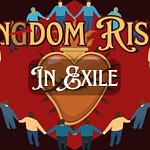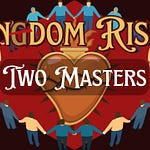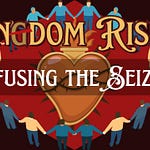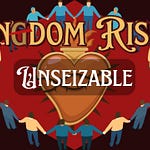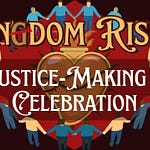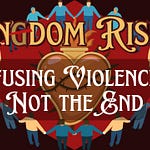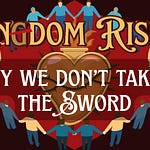For many, the very sound of the word atonement stirs unease. It may recall the tightness in your chest when a preacher spoke of God’s wrath, the guilt-heavy sermons that made love feel conditional, or the sense that your worth was forever in question. In some traditions, atonement was framed as paying off a cosmic debt to a God more feared than loved. This fear-based telling left its mark: a false scarcity mindset where grace is rationed and belonging must be earned.
But even in the shadow of this baggage, something deeper calls. Beneath the layers of fear, there is a quieter knowing that perhaps the word could mean something else. Perhaps atonement is not a shackle but a key, not a sentence but an opening. The hope lingers: that atonement could name the mending of what’s broken, the restoration of a bond never truly lost.
To rediscover that meaning, we look back to the roots. In the Hebrew scriptures, the word for atonement means to cover over a breach, to mend a broken connection. Ancient covenant life understood that relationships within the community and between a people and their God would sometimes fray. Atonement was the process of repair, not payment. It was an act of right relationship.
The shift came with translation. Moving from Hebrew into Greek, the language changed. Greek terms leaned toward commerce, ransom, payment, buying back. This transactional framing spread quickly in the early church, raising questions foreign to the Hebrew imagination: Who held us captive? What was the price? Who was paid? In the centuries that followed, these questions hardened into doctrines, bolstered by medieval church systems that saw spiritual debt as a tool for control. Retributive justice, punishment as the measure of righteousness, took root in both church and culture, and the older vision of relational restoration faded from sight.
Christopagan practice invites us to dig beneath those later layers. When we do, the older vision re-emerges: atonement as the ongoing work of mending relationships, living in right relationship with ourselves, with Spirit, with one another, and with the living world.
This deeper truth speaks directly against the false scarcity mindset. Divine love is not meted out to the worthy few — it is unending, abundant, unbreakable. Even our pain, even our sense of falling short, is not proof of rejection but proof of life. The ache we feel when something is broken is the sign that we are still connected enough to long for repair.
Like a mother cradling her child, Spirit does not withhold love until we prove ourselves. The embrace is there before the apology, before the change and it is that embrace that makes change possible. Atonement in this light is not appeasement; it is participation in the endless flow of love.
This personal restoration cannot remain inward. Once the beam is removed from our own eye, once we have reclaimed our right relationship with self and Spirit, we are able to help mend what is broken in our communities. Personal healing becomes the soil in which communal healing grows.
In Christopagan practice, this often looks like small but steady acts: repairing trust with a friend, reconciling after conflict, ensuring that our circles of belonging are truly open. It also shapes the way we resist harm. Rather than perpetuate cycles of retribution, we seek restoration. Rather than closing the door forever, we create space for those willing to return in honesty and humility.
Atonement becomes the pattern of our life together, not as a one-time event, but as a shared rhythm. When harm is done, the question is not “How do we punish?” but “How do we mend the breach?” Sometimes that mending restores relationship; other times it simply brings peace and prevents further harm. Either way, it moves us toward wholeness.
To live this way is to make atonement a daily choice. It is a personal decision enacted through action, renewed each day as we move through the world. It begins in the quiet of our own hearts. In prayer, in discernment, in the willingness to see clearly where the breach lies. And it comes alive in what we do: offering a needed apology, returning what was taken, showing through our choices that we will not repeat the harm.
Spiritual practice fuels this work. Prayer and ritual keep us grounded in love’s abundance. Discernment helps us hold grace and boundaries together. Ethical action gives form to what we believe, making our faith visible in the way we live.
Not every relationship can or should be restored. There are harms that require distance, boundaries that protect the vulnerable. But as a people, we can create communities that make repair possible, that honor both justice and mercy. This is what it means to embody atonement. To let it guide not just what we say, but how we move, how we mend, how we belong.
Christopagan atonement is not a chain but a key. It is not a demand for payment but an invitation to return. At its heart, it is the work of mending, the living choice to be in right relationship with ourselves, with Spirit, and with each other. It is the repair of a bond that fear could not destroy, the reconnection to love that never left us.
In this light, atonement is hope. It is liberation from the false scarcity mindset that tells us love must be earned. It is the healing of wounds left by retributive theologies. It is the steady hand beneath us as we learn to walk in love again. It is the voice of Spirit whispering, “You are mine, and you are loved,” even when we feel lost.
And as we heal, we become healers. The work that begins in us flows outward, mending the fabric of our communities, helping others remember that love is endless, that the breach can be healed, and that we belong to one another.
Thank you for Tips / Donations:
Substack: https://www.creationspaths.com/
New to The Seraphic Grove learn more
For Educational Resource: https://wisdomscry.com
Social Connections:
#Christopagan #CreationSpirituality #RightRelationship #RestorativeJustice #SpiritualHealing #Atonement #PaganChristianity #Metanoia #HopeAndLiberation #HealingTheBreach
Chapters:
00:00 Introduction to Atonement in Progressive Faith
01:12 Host Introductions
02:21 Channel Updates and Series Information
02:48 Traditional Understanding of Atonement
05:53 True Meaning of Atonement in Covenant Faith
08:33 Historical Evolution of Atonement Concept
12:27 Christopagan Perspective on Atonement
20:22 Actions vs Words in Right Relationship
24:27 Making Amends and Societal Restoration
29:14 Closing Thoughts and Prayer


